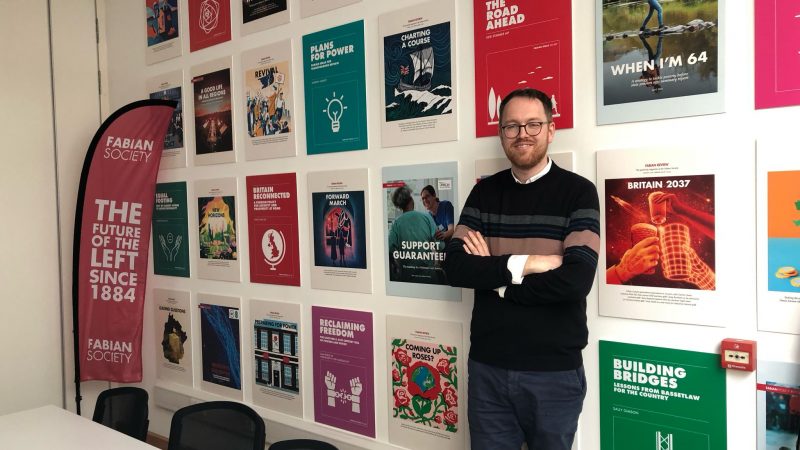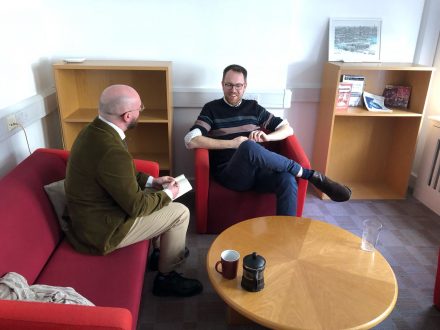
Speaking to LabourList from inside the Fabian Society’s HQ in a Westminster townhouse, the think tank’s new general secretary Joe Dromey is telling the story of how he came to be involved in the Labour movement.
For a man the tabloids call one of Labour’s Red Princes – due to his parents being Harriet Harman and the late MP Jack Dromey – he is surprisingly humble.
Despite coming from a political family, he said he became “politically conscious” while studying at university in the early 2000s, at what was “quite a challenging time” for Labour.
“It was a time where Labour was in government, they were seen as the establishment.”
Dromey only decided to become actively involved in Labour when Nick Griffin stood in Barking in 2009.
“For me, growing up in London – one of the most diverse cities in the world – it was anathema to everything that I thought we stood for as a city.
“So I got involved in the campaign against Nick Griffin in Barking.
“Then got involved locally, doing the vital – but not the most glamorous – jobs in my ward and in the CLP as well, and then ended up standing for the council in 2014.”
He said his decision to get involved was “reactive” against the far right.
“And I’m passionate about local government, the importance of localism, and the need for devolution. It’s fantastic to be working with a Labor government that’s come to power in order to give it away, because you often get a zeal for devolution in opposition that doesn’t make it into government.”
The Red Prince
Asked about the Red Prince moniker, given to the children of Labour grandees who also work with the party – such as Stephen Kinnock, and Hilary Benn – Dromey appears uncomfortable for a second. He chews the question over before answering thoughtfully.
“I’ve learned that you focus on what you can control and what you can do, and not worry about things that you can’t control and what you can’t do. If people think that I’ve got any position because of my parents, I can’t control that. All I can do is do my best and try and have a positive impact and try in time to prove people wrong.
“So that’s what I’m focused on. I’m incredibly proud of my parents, but I don’t want to be judged by them, by their successes, by their mistakes. I want to be judged on what I do, what I believe.”
His father, Jack, a titan of the labour movement, passed away in 2022. Dromey said he was “incredibly proud” of him.
“We loved him very much. We miss him a lot. He achieved a great deal, and we were very proud of that. It’s helped shape who I am as a person.”

Only hope can defeat the far right
Indeed, Dromey, like his father before him, isn’t a man short on conviction.
On the far right, he believes their success depends on people’s “day to day experiences, their conditions, the extent to which they are hopeful about their future, and the extent to which they feel they can trust mainstream politics”.
He cites the “longest squeeze on living standards since Napoleon” and public services being “on their knees”, as creating the conditions in which the far right has thrived.
He’s sceptical that taking a harder line on immigration is the way to beat the far right.
“I think it’s interesting that in her first actual policy intervention, Badenoch has gone on immigration, on an absurd policy that would kick out care workers that we’ve been relying on to provide the care that people need.
“And that clearly shows that on the right we’ll have two parties competing over who can be hardest on immigration, and I don’t think that’s where the next election will be won or lost. It’s about hope – improvements in living standards, in public services – and hope for the future.”
Tackling wealth inequality
For Dromey, the labour movement needs to both argue against the far right’s rhetoric while also improving living standards and delivering growth.
To that end, he’s also keen to tackle wealth inequality. While he recognises that Labour needs to keep the business community on side – and grow the economy – he adds that “distribution matters as well”.
“We know that many of society’s ills are linked, not to the size of the pie, but to the distribution.”
In particular, he said we tax work “relatively high” and yet tax capital “in a very minimal way.
“I think we shouldn’t overstate how much we could make from a wealth tax. The Greens have got some quite ambitious kind of forecasts for what they could raise in a wealth tax.
“But I think rebalancing between earned income from labour and unearned income from capital is something that we should definitely be looking at, and something that the Fabian Society is going to be looking at as well.”
The future of the left?
The Fabian Society occupies an unusual position in British politics, being both a think tank and an affiliate of the Labour Party. The Society’s tagline at the recent New Year’s conference – where health secretary Wes Streeting and Environment Secretary Steve Reed were both speakers – was “the future of the left since 1884”.
Dromey is acutely aware of that dichotomy, of the Fabians laying claim to both the future and the past of the party. In the late 19th century, following industrialisation, enormous wealth had been accumulated by a small number of people.
The first Fabians were brought together to address that inequality, he said, and the present day is no different.
“So I think the future of the left is as it ever was, about tackling inequality, and that’s about economic inequality, but also about social inequality, political inequality, making sure that people have access not only to the financial means to have a decent life, but control, and a say, in their own life – and a feeling of respect and dignity.
“That’s what we’re committed to in the Fabian Society, reversing the increase in yawning inequality that we’ve seen over the last 40 to 50 years.”
Fabians in power
However, now that Labour is in government, he said the Fabian’s role would need to change too. In opposition, the society’s analytical work is “really important” to help Labour understand the challenges it faces, he said, but in government the party has the civil service to help them.
“That means the Fabian Society has got a slightly different role to play, which is more about thinking about the politics alongside the policy, thinking more about the long term policy agenda, looking around corners and thinking about the challenges we’ll be facing in three or four years’ time.”
Dromey recognises that wealth inequality in the UK isn’t just between individuals, but between regions too.
He said devolution, and “putting power funding and accountability” in the hands of local leaders was a “vital” part of addressing that imbalance.
“This is an area where Labour are genuinely radical.”
Citing Rachel Reeves’ growth speech, which was criticised for its southern focus, he pointed to significant schemes in the north – including the redevelopment of Old Trafford.
Starmerism as a conscious return to class politics
It’s a radicalism that many critics of the Labour party feel they’re missing, with some saying the party lacks a coherent ideology – a Starmerism akin to Thatcherism or Blairism.
Dromey doesn’t think Keir Starmer is much concerned about that.
“I’m not sure Keir would be that bothered about what Starmerism is perceived to be. What drives him is a commitment to improve the lives of working people.
“It’s like a conscious return to a kind of class politics. So he’s the most working class Prime Minister we’ve had in a very long time. He understands, personally, how significant class inequality can hold people back, and stop them from achieving their potential.”
For more from LabourList, subscribe to our daily newsletter roundup of all things Labour – and follow us on Bluesky, WhatsApp, Threads, X or Facebook .
- SHARE: If you have anything to share that we should be looking into or publishing about this story – or any other topic involving Labour– contact us (strictly anonymously if you wish) at [email protected].
- SUBSCRIBE: Sign up to LabourList’s morning email here for the best briefing on everything Labour, every weekday morning.
- DONATE: If you value our work, please chip in a few pounds a week and become one of our supporters, helping sustain and expand our coverage.
- PARTNER: If you or your organisation might be interested in partnering with us on sponsored events or projects, email [email protected].
- ADVERTISE: If your organisation would like to advertise or run sponsored pieces on LabourList‘s daily newsletter or website, contact our exclusive ad partners Total Politics at [email protected].





More from LabourList
‘As metro mayors gain power, Labour must tighten political accountability’
Letters to the Editor – week ending 22 February 2026
‘The coastal towns where young people have been left behind by Whitehall’